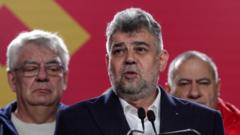In a surprising outcome, Friedrich Merz, leader of Germany's Christian Democrats, secured only 310 votes in his initial chancellor bid, falling short of the 316 needed. This unprecedented setback reveals internal conflicts within his coalition and raises questions about future governance.
Friedrich Merz's Bid for Chancellor Thwarted by Unexpected Vote Shortfall

Friedrich Merz's Bid for Chancellor Thwarted by Unexpected Vote Shortfall
Germany's conservative leader Friedrich Merz falls short in his initial vote for chancellor, highlighting political tensions and dissent within coalition ranks.
Germany is facing political uncertainty as Friedrich Merz, the leader of the Christian Democrats, fell short in his attempt to secure the chancellorship in a crucial vote in the Bundestag. Needing 316 votes in the 630-seat parliament, he managed to garner only 310—a failure that has sent shockwaves through Germany's political landscape. With two and a half months having passed since the federal elections, the anticipation surrounding Merz's bid was high, making this shortfall a significant blow to his leadership.
Merz's coalition, which includes the center-left, holds enough seats to govern, yet it appears that dissent within the ranks robbed him of crucial support. Eighteen Members of Parliament, who were initially expected to back his candidacy, chose to oppose him. This moment marks an unprecedented occurrence in modern German history, as no candidate has faced such a setback since the country established its current parliamentary system in 1949.
The Bundestag now has a 14-day window to either elect Merz again or consider alternative candidates for chancellor. Interestingly, the German constitution permits an indefinite number of votes; thus, parties may continue voting until a majority is reached, or a candidate may ultimately be elected without absolute majority support.
Commentators are reacting to Merz's failure with a degree of alarm, interpreting the circumstances as a humiliation—primarily influenced by dissent from the Social Democrat SPD party, which recently solidified a coalition agreement with the conservatives. Internal conflict within the SPD adds complexity, as not all members endorse the coalition deal. The implications of Merz's defeat could result in considerable challenges for him as he attempts to unify his party and government following the collapse of the previous administration.
The far-right Alternative for Germany party, which achieved notable success in the previous elections, has seized on Merz's vote misfire, highlighting the fragile dynamics within the coalition he leads. Joint leader Alice Weidel commented on social media, indicating that the coalition's weaknesses reflected a broader rejection by voters.
In a ceremonial transition, outgoing Chancellor Olaf Scholz attended the Grand Tattoo, a traditional military event, on the eve of the vote. Friedrich Merz, at 69, had aspirations for the chancellorship and was set to fulfill a career-long goal. His former rival, Angela Merkel, was also present in the Bundestag to witness the moment unfold.
Now, Merz faces a pivotal decision regarding whether to pursue a second vote with his coalition partners, weighing the risks of another potential failure against the need for swift action in governing Germany. With the political landscape becoming more complex, the road ahead for Merz and his coalition is fraught with uncertainty.





















